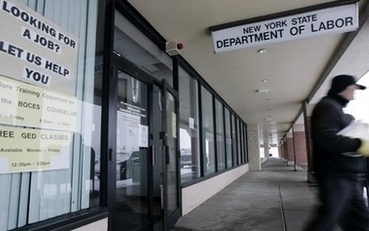Dangerous cracks appearing in US job market
Updated: 2008-03-09 16:58
WASHINGTON -- Dangerous cracks in the nation's job market are deepening. Employers slashed jobs by the largest amount in five years and hundreds of thousands of people dropped out of the labor force -- ominous signs that the country is falling toward a recession or has already toppled into one.
For the second straight month, nervous employers got rid of jobs nationwide. In February, they sliced payrolls by 63,000, even deeper than the 22,000 cut in January, the Labor Department reported Friday.
|
|
The grim snapshot of the country's employment climate underscored the heavy toll the housing and credit debacles are taking on companies, jobseekers and the economy as a whole.
"It sounds like the recession bell is ringing for the US economy, although it is still faint," said Stuart Hoffman, chief economist at PNC Financial Services Group.
On Wall Street, stocks tumbled. The Dow Jones lost 146.70 points, a little more than 1 percent to close at 11,893.69. The Dow was down 370 for the last two days of the week.
The shower of pink slips was widespread. Factories, construction companies, mortgage brokers, real-estate firms, retailers, temporary-help firms, child day-care providers, hotels, educational services, accounting firms and computer designers were among those shedding jobs. All those cuts swamped job gains at hospitals and other health care sites, bars and restaurants, legal services and the government.
"Losing a job is painful, and I know Americans are concerned about our economy; so am I," said President Bush. "It's clear our economy has slowed."
The big question: Just how much? The weak employment report pushed an increasing number of private economists into believing the economy is probably shrinking now. Under one rough rule, the economy would have to contract for six months for the country to be considered in a recession.
The unemployment rate actually dipped slightly from 4.9 percent to 4.8 percent, as 450,000 people left the labor force for any number of reasons. Economists thought many people probably gave up looking for work.
"It stands to reason that a large share of the people left because they didn't feel like anything was there for them -- that the market was too weak to be searching for a job at this point," said Mark Zandi, chief economist at Moody's Economy.com.
To relieve persistent credit problems, the Federal Reserve announced Friday that it will increase the amount of loans it plans to make available to banks this month to $100 billion. The Fed already has provided a total of $160 billion in short-term loans to cash-strapped banks since December. The Fed, in another step, said it will make $100 billion available to a broad range of financial players through a series of separate transactions.
Crumbling employment conditions are feeding fears the economy will fall victim to all the stresses. Until recently, the positive forces of job and wage growth have helped to offset the negative forces hitting people from the housing and credit crises. Now people and businesses alike are more cautious, spelling more trouble for the economy.
"The debate should no longer be about whether there is or is not a recession, only about how deep it will be," said Nigel Gault, chief economist at Global Insight.
|
|
|
||
|
||
|
|
|
|








